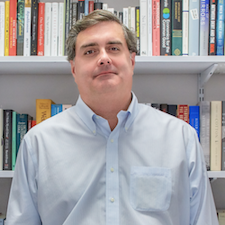Uncertainty, imperfection, and hope
Published on July 1, 2010
I recently finished a book by Stephen Green, chairman of HSBC, one of the largest banks in the world, and an ordained priest in the Church of England since 1988. Good Value: Reflections on Money, Morality, and an Uncertain World (Atlantic Monthly Press, 2010), is an extended meditation on globalization and economics.
Mr. Green prefaces his analysis by asking us first to accept and make peace with three “perplexing realities” or permanent “ambiguities” as he calls them. The first ambiguity lies in the unavoidable imperfection of human nature. Human beings are idealistic, driven to imagine ideas and objects of great beauty and purity. Yet, the very moment we strive to create, to make those ideas part of the world, they become flawed, imperfect, in short, they become human. Imperfection, thus, is “deeply part of us, and we are part of it.”
The second ambiguity lies in the nature of human progress. The old certainty of ever onward progress, especially prevalent after the fall of Berlin Wall, has given way to a “much more uncertain sense of where we are going.” This feeling is particularly acute in the field of economics, where the most sophisticated economic system the world has ever known turned out, after all, to have been built on a sand foundation. Looking forward it is not entirely clear how things will play out. It could very well be that the world could be significantly worse for our grandchildren or we could find a way to work it out for the better. Climate change, extreme poverty, pandemics and plagues are all probable in the near future. But so are better health care, increased education, and higher standards of living. That is the point, we just do not know.
Green’s third ambiguity lies in the nature hope. According to Green, humankind has the remarkable ability to keep hoping that something better is always possible, even in the face of unspeakable evil. We just “go on hoping, often in the teeth of the evidence.” This is, Green says, the “central ambiguity of our existence.” This hope is not naïve, nor is it based on stale assurances or on the common platitudes of government propaganda. This is hard hope, born out of the existential belief that humanity will not only endure but prevail.
Imperfection, uncertainty about progress, and hope, those are Green’s three essential ambiguities it is necessary to accept in order to make sense of our complex reality. To those three I would add a fourth, what historian Barbara Tuchman called the “march of folly” or the pursuit of policies contrary to self interest. According to Tuchman, humanity has demonstrated throughout history an extraordinary propensity to pursue counterproductive policies, from the Renaissance Popes to the U.S. in Vietnam.
Such folly can be the product of: (1) self-deception; (2) the stubborn refusal to benefit from experience; (3) the unfounded belief that “there is no other alternative”; or (4) underestimating opponents. Whatever its source, misgovernment appears to be a historical constant. President John Adams put it well when he said that “while all other sciences have advanced, government is little better practiced now than three or four thousand years ago.”
All of this is quite relevant to the current debate in Europe regarding fiscal policy. In England, for example, the Cameron government has submitted an emergency budget with significant cuts and tax increases. The politicians pushing for these cuts are not citing the work of economists from the Chicago School; rather they talk about the need to restore “confidence in the markets.” In other words, the debate is not about policy, but rather about refusing to live with imperfection, rejecting uncertainty, and blindly hoping it will all work out in the end.
However, it may all turn out to be an immense folly. Robert Skidelsky, biographer of John Maynard Keynes, draws an interesting parallel in a recent analysis in the Financial Times. According to Skidelsky, Keynes reacted with horror to the emergency budget presented by the Conservative-Liberal coalition ruling in 1931, calling it “replete with folly and injustice.” In Keynes’s view, that budget was supported by all those who “hated social progress” and believed that “by refraining from every form of economic activity, we can all become prosperous again.”
We in Puerto Rico are not exempt from such folly either. One of the first things Theodore Roosevelt, Jr. did when he was appointed governor in 1929 was to cut spending and seek to balance the government’s budget, thus deepening the island’s recession. It appears that Roosevelt’s Republican descendants in Puerto Rico have learned nothing and forgotten nothing since then.
Given Puerto Rico’s dire economic situation, we would do well to disregard ideological blinders, learn to live with imperfection, accept uncertainty, and keep hope alive in the face of monumental folly.

